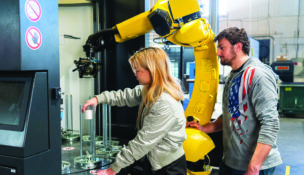Energy disruptors who are saving money ― and the planet
They're watching the bottom line and the bigger picture
Nora Caley //January 17, 2017//


Energy disruptors who are saving money ― and the planet
They're watching the bottom line and the bigger picture
Nora Caley //January 17, 2017//

J. Mastic launched a company called Green Office Ideas in 2007, with the goal of helping businesses buy remanufactured ink and toner cartridges, recycled paper and ENERGY STAR-rated office equipment. It turned out clients were more interested in saving money than saving the planet.
“Most people just cared about their energy bill,” he says.
Mastic, who studied finance and entrepreneurship at University of Colorado Boulder, decided to focus more on construction, an industry in which his family had a background. He shifted his concentration to energy efficiency and worked with commercial real estate clients to retrofit their spaces.
“My bleeding heart said this is the right thing to do, while my finance side said this is where the money is,” he recalls.
So he launched Ecosystems, an energy service company (ESCO) in 2010 in Boulder. Ecosystems specializes in serving small businesses that own or rent commercial buildings to save money and energy, mainly with high-efficiency lighting. Ecosystems has worked on everything from hair salons to the 300,000-square-foot Denver Athletic Club, where it replaced more than 350 candelabras with more energy-efficient fixtures and high-performance court lighting.
Ecosystems also helps companies get project financing, submit forms for rebates, and buy energy efficient lighting without the markups from manufacturers reps, wholesalers and others.
“We are a small distributor that also acts as a consultant and project manager and brings finance to the table,” Mastic says. The 10-employee company moved to Denver this year.
Other companies shaking things up in the energy space include Boulder-based Simple Energy, which uses behavioral science concepts such as normative comparisons, goal-setting and loss aversion to help utilities incentivize people to save energy. Formed in 2011, the company works with utilities to set up platforms in which consumers can compare their energy usage to similar households, meet energy saving goals, earn badges and buy items such as Wi-Fi thermostats from the Xcel Energy Store.
A visionary on the horizon is Emergy, a company established at CU Boulder in 2015. University researchers developed a bio-manufacturing process that uses a fungus cultivated in brewery wastewater to create the carbon-based materials needed to make energy storage cells, or batteries used in smartphones and laptops.
“This is a very disruptive way to make materials,” Emergy CEO Tyler Huggins says. “It’s a technology that can produce high-value materials at significantly lower cost.”
He and Emergy co-founder Justin Whiteley expect the material to be ready to market in two years.























